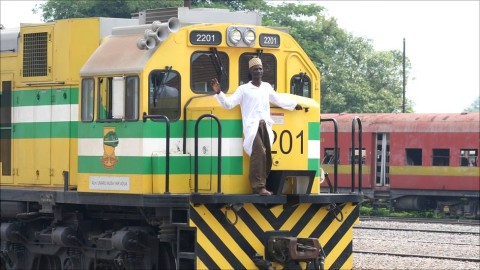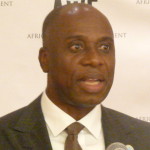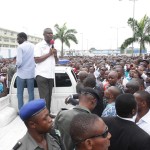Railways and Political Backwardness in Nigeria, By Owei Lakemfa
Articles/Opinion, Featured Contributors/Columnists, Latest Headlines Tuesday, August 2nd, 2016
BALTIMORE, MD (AFRICAN EXAMINER) – Nigeria’s first speed train rolled off on July 26 in a roar of controversy. The ruling All Progressives Congress (APC) held it up as its achievement. Its vociferous hailers claimed that it was completed due to the seriousness of its government. They presented it as an abandoned project by the Jonathan Government which they claimed, failed to pay the needed counterpart funding. The completion of the project to them, is an indication that the APC has a lot of good projects in store for Nigerians.
The opposition Peoples Democratic Party (PDP) denied the project was starved of funds. It commended former President Goodluck Jonathan for the project’s “conceptualization and inception” and credited his Finance Minister, Ngozi Okonjo-Iweala with its structuring and funding. It claimed the project was 99 percent completed before the APC strolled into power. PDP spokesperson, Prince Dayo Adeyeye added the hyperbolic: “The truth which history will bear out is that the PDP in its 16 years of rule successfully completed numerous projects that substantively changed the infrastructural landscape of Nigeria. Every one of those 16 years were years of great productivity with remarkable landmark achievements. This is very much unlike the APC which has already wasted one full year without even scratching one square meter of ground anywhere in the country.”
While the politicians bicker like over fed babies, they did not consider it shameful that despite our enormous resources and oil wealth since 1958, we are having our first speed train over half a century after Japan had developed its Shinkansen (Bullet train) network of speed trains. The Tokaido Line in Japan which started running on October 1, 1964 had a speed of 250 kilometres in contrast with the 200 kilometres Nigerian politicians are struggling to claim credit for. It is rather, tragic that we are just building a single speed train – not a network – for a country of over 180 million people, 118 years after trains started running in our country. Our political leaders should hang their heads in shame rather than be noisy over a project built by the Chinese as a friendly gesture, with the China Export –Import Bank granting us a concessionary $500 million loan for the train while we were merely required to provide $374 million counterpart funding. Does it matter whether this money was fully paid by the former PDP government or partly by the current administration? Did the fund come from an individual’s pocket or the collective purse of the people?
Should the Nigerian elite not be a bit thoughtful or reflective? It had so much money that it declared at a point that the country’s problem was not money, but how to spend it; yet it could not build mass housing, introduce free education or build a single speed train. Since 1964, Japanese, using speed trains, could easily live in one city and work in another without stress; in contrast, a Nigerian cannot even work in one part of Lagos or Abuja and live in another without being stressed. In fact, some in Lagos spend three to four hours in traffic jam trying to get to work, and another two to three hours trying to get home.
Our painful history of governance show that trains constructed by British colonialists began to run in Nigeria in 1898; never mind that they linked the hinterland to the seaports to evacuate our raw materials and other resources to the mother country. Our tragedy is that since then, the only major expansion carried out was in 1964. By 1984, this basic means of cheap, affordable, safe, dependable, easily manageable means of mass transit, had been killed in favour of road transport. Expensive trailers, damaging roads and causing a deluge of accidents, replaced the trains in hauling goods across our large country. Oil tankers burn fuel over one or two days lifting petroleum products from Lagos to parts of the country. The country annually, loses a minimum of 6,000 lives and S100 billion to road crashes. We have become so degenerate that the major means of ‘mass transit’ in most Nigerian cities is the secondhand motorcycle which while designed to carry a single passenger, guzzles fuel, emits lots of fumes and endangers the untrained rider, passenger and other road users. Neither the commercial motorcycle rider nor his passenger(s) – sometimes there are up to four passengers on a single bike – wear protective helmets. In fact, in many Nigerian cities, the commercial motor cycle is the highest donor of patients to orthopedic hospitals.
Whenever I sit in bullet trains especially in China, travelling at 290 kilometres per hour, I weep internally for my country. Same when I board trams in Europe. Because I cannot forget my readings which tell me that we had these in Nigeria in colonial times. The Lagos Steam Tramway which ran from the Marina through the Race Course, Ereko, Idumota, Ebute Ero, over the old Carter Bridge linking the railway terminus at Iddo, began to run on May 23, 1902, that is 114 years ago!
Lagos had a second tram system; the Lagos Sanitary Tramway which was used to carry night-soil. Built 110 years ago, it ran through the Ereko Market, Strachan Street, Glover Street to the Itafaji Market. This was at a time when parts of Europe were still dependent on night-soil men! The Wushishi Tramway which began to operate about the same time as the Lagos Tramway, ran from Zungeru through Wushishi.
Our history of railways show serious neglect of the people and deficit infrastructure. Given the fact that railways are the best means of mass transit, offer mass employment; are responsible for the development of many Nigerian towns they pass through; and can move our agricultural products, raw materials, finished goods, fuel and cattle cheaply and efficiently, its neglect hitherto, is rather criminal.
With the general neglect of the populace for some five decades, our political leaders have a lot of work to do rather than make a career out of propaganda. Therefore, Nigerian political parties need to work efficiently and noiselessly like the bullet train, rather than being as noisy as the Eighteenth Century railways.
Related Posts
Short URL: https://www.africanexaminer.com/?p=34665





















